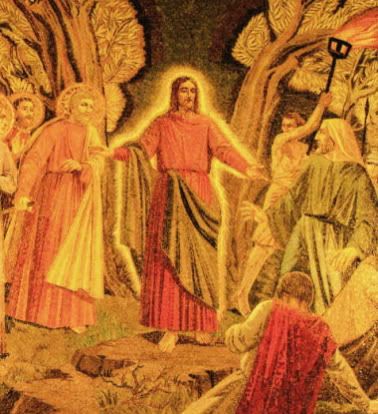
There are a few places in the gospels where we come across what I like to call "Steven Spielberg moments." That is, if it were in a film, there would be dazzling special effects. The obvious one is the transfiguration. But I would also put the "divine shock" of Mark 5:30 in that category ["At once Jesus realized that power had gone out from him. He turned around in the crowd and asked, 'Who touched my clothes?'"].
In my Sunday School class, we speculated if we had come across another in John 18:6. The passage, which describes the arrest of Jesus, reads:
So Judas, having procured a band of soldiers and some officers from the chief priests and the Pharisees, went there with lanterns and torches and weapons. Then Jesus, knowing all that would happen to him, came forward and said to them, "Whom do you seek?" They answered him, "Jesus of Nazareth." Jesus said to them, "I am he." Judas, who betrayed him, was standing with them. When Jesus said to them, "I am he," they drew back and fell to the ground. So he asked them again, "Whom do you seek?" And they said, "Jesus of Nazareth." Jesus answered, "I told you that I am he. So, if you seek me, let these men go." This was to fulfill the word that he had spoken: "Of those whom you gave me I have lost not one."
What exactly does it mean that "they drew back and fell to the ground" when Jesus spoke? Was it because they were so astonished? Was it because of some supernatural force? As one commentary noted, it calls to mind Psalm 9:3--"When my enemies are driven back, they will stumble and perish at your presence." It also calls to mind Revelation 19:5--"Out of his mouth comes a sharp sword with which to strike down the nations." I confess it made me think of Yoda slamming Palpatine's imperial guards against the wall in Star Wars: Episode III.
The Amplified Bible says, "they (drew back, lurched backward) and fell to the ground." The Message translates it as, "The soldiers recoiled, totally taken aback." Young's Literal Translation states, "they went away backward, and fell to the ground."
I'm still not sure what to make of the passage (If only the evangelists had written their own commentaries!). I think what can be said at least is that in John's way of telling the story there is a strong physical reaction by the guards that seems to be connected to Jesus identifying himself by means of invoking the divine Name ("I am."). I think the most insightful observation I found came from the Jerome Bible Commentary:
Jesus remains entirely in command of the situation. Knowing what is to happen, and he takes the initiative in addressing the armed force; Judas the betrayer stands by impotently. At Jesus' identification of himself ("I am he") the throng is thrown back in confusion; whatever the psychological explanation of the recoiling of Jesus' enemies from his calm presence, John interprets their action as an unconscious recognition of a divine appearance. Finally, Jesus protects his own from destruction, even as he promised he would (c.f. 6:39; 17:12).


No comments:
Post a Comment